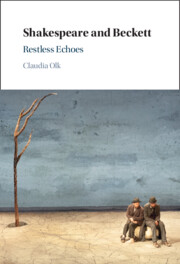Book contents
- Shakespeare and Beckett
- Shakespeare and Beckett
- Copyright page
- Contents
- Acknowledgements
- Abbreviations
- Introduction
- Chapter 1 Shakespeare and Beckett on the Edges
- Chapter 2 Molecular Shakespeare – Beckett Reading Shakespeare through Joyce
- Chapter 3 ‘Some remains’: Beckettian and Shakespearean Echoes
- Chapter 4 Purgatory and Pause – Shakespeare, Dante and the Lobster
- Chapter 5 ‘[It is] winter/Without journey’ – Still Lifes in Beckett and Shakespeare
- Chapter 6 Endgames
- Chapter 7 Theatres of Sleep
- Conclusion
- Bibliography
- Index
Chapter 7 - Theatres of Sleep
Published online by Cambridge University Press: 19 January 2023
- Shakespeare and Beckett
- Shakespeare and Beckett
- Copyright page
- Contents
- Acknowledgements
- Abbreviations
- Introduction
- Chapter 1 Shakespeare and Beckett on the Edges
- Chapter 2 Molecular Shakespeare – Beckett Reading Shakespeare through Joyce
- Chapter 3 ‘Some remains’: Beckettian and Shakespearean Echoes
- Chapter 4 Purgatory and Pause – Shakespeare, Dante and the Lobster
- Chapter 5 ‘[It is] winter/Without journey’ – Still Lifes in Beckett and Shakespeare
- Chapter 6 Endgames
- Chapter 7 Theatres of Sleep
- Conclusion
- Bibliography
- Index
Summary
A final chapter analyses the idea of sleep and closure in The Tempest, Waiting for Godot, The Winter’s Tale, A Midsummer Night’s Dream, Macbeth, Cascando, Nacht und Träume, Footfalls and Rockaby. The rhythm of sleeping and waking pervades the diurnal structure of Waiting for Godot, and many of Beckett’s characters sleep waking or wake sleeping. Likewise, the chapter addresses the many ways in which Shakespeare’s œuvre stages sleep. Staged sleep introduces a further level to the theatrical experience of seeing and being seen, of active and passive characters. In Shakespeare’s and in Beckett’s plays sleep can be read as a liminal state, in which the bodily presence simultaneously refers to a mental absence. Sleep, the chapter argues, becomes a productive meta-dramatic state, in which the theatre foregrounds the boundary between reality and illusion that affects the relation between the actor and the audience.
Keywords
- Type
- Chapter
- Information
- Shakespeare and Beckett , pp. 181 - 208Publisher: Cambridge University PressPrint publication year: 2023

